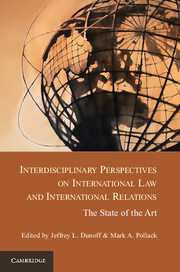 Interdisciplinary Perspectives on International Law and International Relations
Interdisciplinary Perspectives on International Law and International Relations Published online by Cambridge University Press: 05 January 2013
Compliance with international law (IL) has long puzzled scholars and policy-makers. For decades, debates centered around the question of whether IL was even law at all, given its lack of an overarching enforcer (Morgenthau 1948; Hart 1961). Later, international relations (IR) scholars showed that international cooperation was not only possible and sustainable, but also common (Axelrod 1984; Axelrod and Keohane 1986). Around the same time, Henkin (1979: 47) famously stated, “it is probably the case that almost all nations observe almost all principles of international law and almost all of their obligations almost all of the time” (italics in original). But, by and large, most scholars agreed that it was puzzling – even surprising – that states ever abided by their international legal commitments (Keohane 1984: 99; Franck 1988: 705).
Why do – and don't – states comply with international rules? If we do observe compliance, what does this tell us about laws' usefulness as a tool for effecting real changes in how governments treat their citizens, whether they defend their partners when war breaks out, how they apply antidumping measures, and whether they curb pollution? International law scholars have long been interested in compliance. Political scientists have considered compliance with international law puzzling for decades, if not longer, but even ten years ago these questions rarely received in-depth attention in the literature. This has changed dramatically. Across both fields, scholars are interested in how governments use laws to structure their relations with one another, and why, if at all, governments abide by those rules.
To save this book to your Kindle, first ensure [email protected] is added to your Approved Personal Document E-mail List under your Personal Document Settings on the Manage Your Content and Devices page of your Amazon account. Then enter the ‘name’ part of your Kindle email address below. Find out more about saving to your Kindle.
Note you can select to save to either the @free.kindle.com or @kindle.com variations. ‘@free.kindle.com’ emails are free but can only be saved to your device when it is connected to wi-fi. ‘@kindle.com’ emails can be delivered even when you are not connected to wi-fi, but note that service fees apply.
Find out more about the Kindle Personal Document Service.
To save content items to your account, please confirm that you agree to abide by our usage policies. If this is the first time you use this feature, you will be asked to authorise Cambridge Core to connect with your account. Find out more about saving content to Dropbox.
To save content items to your account, please confirm that you agree to abide by our usage policies. If this is the first time you use this feature, you will be asked to authorise Cambridge Core to connect with your account. Find out more about saving content to Google Drive.